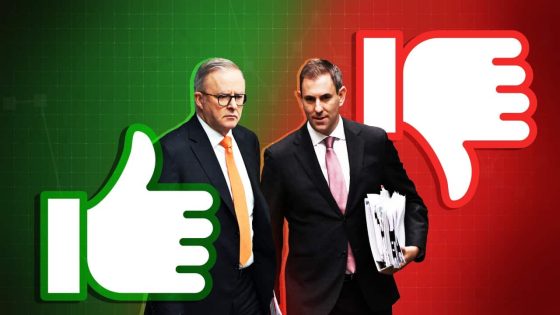Key Points
- A $300 rebate for energy is part of the federal budget.
- There is also more than $160 million allocated to women’s health programs.
- Spending on consultants, contractors and labour hire is being cut.
From a $300 energy bill handout to potentially cheaper sweet potatoes, the list of winners and losers from this year’s budget is a mixed bag.
Here’s a list of who’s getting a helping hand, and who’s missing out.
Who are the winners in the budget?
Some 13.6 million taxpayers will take more of their pay home, in the previously announced changes to the stage three tax cuts.
Treasurer Jim Chalmers said the average benefit would be $38 a week and they would “provide cost-of-living relief … support women and boost labour supply”.
The cuts were the final step of tax changes legislated by the former Coalition government, removing a tax bracket and taxing income between $45,000 and $200,000 at a rate of 30 per cent.
The new plan spreads cuts across the existing tax brackets, reducing the 32.5 bracket to 30 per cent, and increasing the thresholds for tax brackets.
Every household will get from 1 July, at a cost of $3.5 billion.
“We know Australian families and businesses have felt this pain — and that’s why we’ve stepped in to help,” Chalmers said.
From 1 July, every Australian household will receive an energy bill rebate. Credit: AAP
Some renters
The budget provides nearly $2 billion over the next five years to raise the maximum rates of Rent Assistance by an extra 10 per cent.
This comes on top of the 15 per cent announced last September.
It’s the first time the maximum rates have been increased in two consecutive budgets for more than three decades, Chalmers said.
The change would mean an increase in the maximum Rent Assistance payment for single parents or couples with one or two children by more than $70 a fortnight.
The government is promising cheaper medicines for all, by placing a one-year freeze on the maximum Pharmaceutical Benefit Scheme (PBS) co-payment, instead of costs rising with inflation. There will be a five-year freeze for pensioners and other concession cardholders.
Chalmers said the maximum cost of prescriptions under PBS would be frozen, adding: “This year and next year, no one will pay more than $31.60”.
There’s also $361 million for mental health funding. That will also include a new free national digital mental health service to support 150,000 people at a cost of $588.5 million.
The government is providing $3.4 billion over five years for new and amended listings on the PBS and the Repatriation Pharmaceutical Benefits Scheme, including treatments for certain types of heart disease and breast cancer.
The budget has allocated more than $160 million to women’s health.
More than $50 million will go towards maternity care and $49 million towards complex conditions such as endometriosis.
There’s also funding to support women and their families who suffer miscarriages.
There’s also $1 million over two years to support health workers who enrol for a Professional Development course called Managing Menopause.
Those who can only work up to 14 hours a week will get a $55 increase in fortnightly JobSeeker payments, when it is combined with a higher rate of the energy supplement.
The change will mean around 5,000 people move on to the higher rate of JobSeeker payment.
The government wants to spend $423 million over five years to help states and territories build more social housing and homelessness services.
The government is making a further $1 billion available to the states and territories to boost housing supply in well-located areas.
There will also be $1.9 billion in loans to help build 40,000 social and affordable homes.
One million businesses will get a $325 energy rebate, slightly more than that being offered to households.
Around four million will also get a one-year extension of the $20,000 instant asset write off until 30 June 2025.
Age pensioners and concession cardholders will benefit from the freezing of the cost of their medicines for five years under the PBS measures.
Chalmers said this would mean no pensioner or concession cardholder will pay more than $7.70 for the medicine they need.
Separately, there is $2.2 billion in new aged care funding including 24,000 new home care packages and measures to improve systems to allow people to stay in own homes.
Prime Minister Anthony Albanese listens as Treasurer Jim Chalmers delivers the 2024/25 Budget Source: AAP / Lukas Coch
Sweet potato lovers
Lovers of the veggie could save money at the grocer if savings for growers are passed on. The government is changing the agricultural levy and charge on sweet potatoes, by cutting the overall levy rate on sweet potatoes from 1.5 per cent to 0.5 per cent.
A new program for Indian nationals will provide a pathway for 3,000 Indian graduates and early career professionals aged up to 30 with skills and education in targeted sectors to live and work in Australia for two years.
It will be called the Mobility Arrangement for Talented Early-professionals Scheme (MATES) program and will start from 1 November 2024.
There will be a pre-application charge of $25 and an application charge of $365, both of which will be indexed to inflation in future years.
In addition to the pre-announced measures to cap indexation for student loans at CPI or Wage Price Index, there is also $89 million for 20,000 additional fee-free TAFE and VET places to train more construction workers.
To expand access to universities, there’s $350 million for fee-free uni courses from 1 January 2025.
There’s a range of funding for projects across the country, including funding for a rail link between the Sunshine Coast and Brisbane, $1.9 billion for projects in western Sydney including the airport and other road and rail projects, light rail expansion in Canberra, road projects in Victoria and the Metronet rail signalling program in Western Australia.
Who are the losers in the federal budget?
Working holiday makers
Those from China, Vietnam and India wanting to come to Australia on working holiday visas will face a new visa pre-application ballot process from this year.
The ballot process will charge applicants $25, which the government says will help manage demand and application processing times for these countries.
There is no increase in the JobSeeker payment, despite repeated calls from welfare groups and Australians struggling amid the cost of living crisis.
Some JobSeeker payments will be increased in the budget Source: AAP / Dan Peled
Universities
Will have limits placed on how many international students can be enrolled by each university based on a formula including how much housing they build to support them.
A new National Student Ombudsman will begin on 1 February 2025 to allow higher education students to escalate complaints regarding the administrative actions of their education provider. The government says it will explore arrangements for cost recovery from 2026–27.
Public Service Contractors
The government will save $1 billion over four years by cutting its spending on consultants, contractors and labour hire. The government will also commission a second Audit of Employment to measure how the public service is delivering on the government’s commitment to reduce spending on external labour.
Patients will now only have one year to lodge a Medicare bulk bill claim, down from two years.
The government said reducing the time frame will “enable quicker responses to fraud and non-compliance in Medicare” and bring in $33.6 million over three years from 2025-26.





